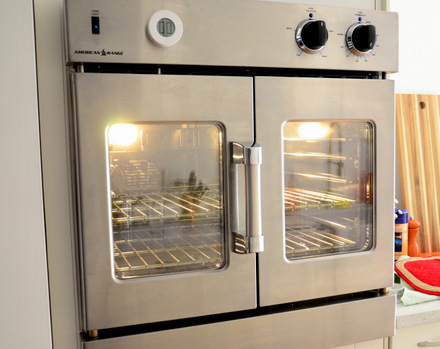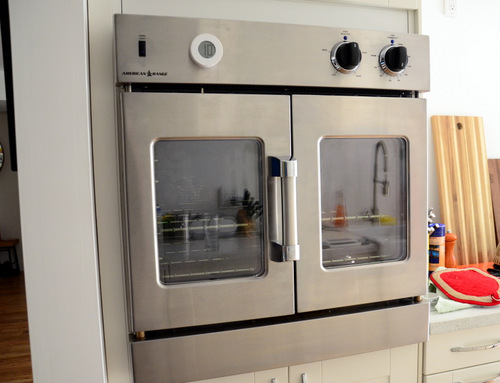
If you read my last post on my renovation, you’ll know that I went with a big gas wall oven for my kitchen, rather than an electric oven. But the majority of ovens these days are electric, even if they’re part of a gas range. The type of oven that you get for your kitchen will depend on how much space you have available, what power sources you have available and what your cooking needs are There are pros and cons to both wall ovens and ranges, electric ovens and gas ovens that are worth taking into consideration when you’re shopping for your next oven.
Wall Oven vs. Range
A range is a unit that has a cooktop and an oven in one. If you have a stand-alone cooktop, you’re probably going to have a separate wall oven. Ranges are convenient because they allow you to streamline the appliance-shopping process. Ranges range from 30-inches wide to more than 60-inches (though those are the exception, not the rule) and most have 4-6 burners on top and a single oven below. The cooktop can be gas or electric, but the ovens will primarily be electric, regardless of what type of heat. If you have limited kitchen space, a range might be the best fit for your kitchen because it gives you two appliances in one, leaving more wall space for cabinets and storage.
Wall ovens can be gas or electric, though electric is far more common. Wall ovens come in single and double models, meaning you can get twice as much oven space as you typically can with an in-range oven.  Both wall ovens and ranges can come with warming drawers and other bonus features, but I’m keeping things basic here because, in my experience, the main oven is more important than a warming drawer any day of the week. If you find yourself baking in large batches, a double wall oven might be the best choice because it will allow you to bake double the number of goodies at once. Wall ovens are also easier to access and don’t require you to bend down or lift heavy items (turkeys, large roasts, etc) from near ground level.
Electric Oven vs Gas Oven
While I like ranges, since I was keeping my vintage cooktop, a wall oven was really the only option for my particular kitchen. Since the wiring in my kitchen dates back to the 1960s, it couldn’t handle the extra wattage required by a large, modern electric oven without some major electrical upgrades. For me, these upgrades would have been so expensive, it made sense to just get a bigger, better (more expensive) oven and stick with gas power in my case.
Both types of ovens have their pros and cons. Electric ovens give you the most choice, as it seems like 90% of the ovens on the market are electric. You can find them at all price points, from very affordable to very high end. They usually perform well and I find that there is a wider range of technology available (such as remote start and other “smart” features) to work with them. That said, there are also cons. Though it will depend on where you live, electric ovens may be more expensive to run than gas ovens. In my area (Southern California), gas ovens are much less expensive, even if I run mind all day long. In my experience, electric ovens can be more prone to hot spots than gas ovens, though that can depend on the configuration of the heating elements in both types of ovnes.
Gas ovens are less common and offer fewer options when you’re picking out an oven. The majority are 24-inch wall ovens (designed to replace older, vintage ovens without requiring renovations). Full 30-inch ovens (which is what I now have) are extremely limited and are more expensive than similar electric ovens  would be. Gas ovens are very reliable, in part because they tend to be more straightforward in their construction than their electric counterparts. They heat up quickly and are very efficient. You aren’t as likely to get bonus drawers and “smart” features with them, however.
How To Choose
Start by deciding what your oven needs are and where you need your oven to be in the kitchen. Do you need more oven space than you currently have? More storage space? If you are upgrading an existing appliance, that may limit your options. Once you know where it will go, decide on a ballpark price and start comparing gas vs electric models. Decide if you need extra features (“smart” features) or if you are find without them. Both gas and electric ovens have their pros and cons, but there are great ovens in both categories out there.
Choosing an oven is going to be a very personal process because your personal tastes are going to play a big role in the look of your final choice of appliance. I recommend being open to all options and being smart about your choices. When I found out it was going to cost more to upgrade my electrical to accommodate a less expensive oven than to get a higher end oven, I went with the more expensive oven and actually came out ahead. I chose a french door model because I love the look and have been extremely happy with the consistent performance of my gas oven – as well as with how inexpensive it is to run.






What do you think?